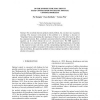Free Online Productivity Tools
i2Speak
i2Symbol
i2OCR
iTex2Img
iWeb2Print
iWeb2Shot
i2Type
iPdf2Split
iPdf2Merge
i2Bopomofo
i2Arabic
i2Style
i2Image
i2PDF
iLatex2Rtf
Sci2ools
111
click to vote
AUTOMATICA
2008
2008
On the infinite time solution to state-constrained stochastic optimal control problems
: For an infinite-horizon optimal control problem, the cost does not, in general, converge. The classical work-around to this problem is to introduce a discount or "forgetting" factor, diminishing the importance of future cost. This will, however, affect the computed solution. Here, a method is presented whereby a Hamilton-Jacobi-Bellman equation can be solved without the use of a discount factor. The HJB equation is reformulated as an eigenvalue problem, such that the principal eigenvalue corresponds to the expected cost per unit time, and the corresponding eigenfunction gives the value function (up to an additive constant) for the optimal control policy. For a certain (relevant) class of problems, the eigenvalue problem is linear, making it possible to find a numeric solution very quickly.
Related Content
| Added | 08 Dec 2010 |
| Updated | 08 Dec 2010 |
| Type | Journal |
| Year | 2008 |
| Where | AUTOMATICA |
| Authors | Per Rutquist, Claes Breitholtz, Torsten Wik |
Comments (0)

